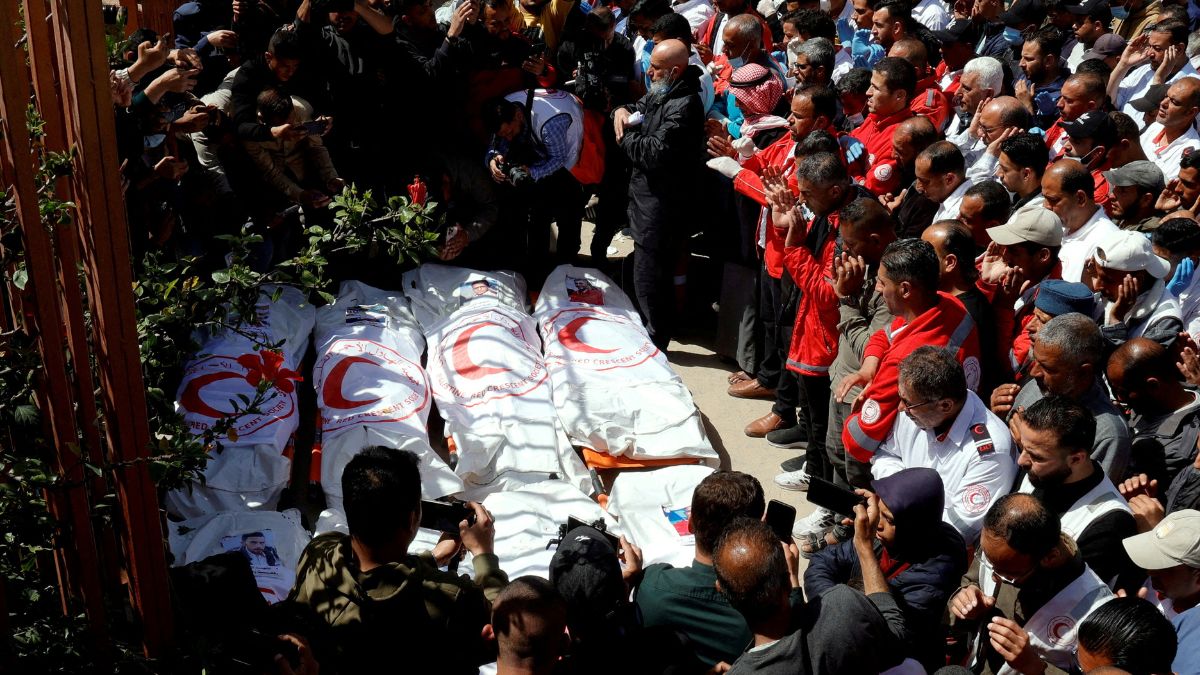OPINION | Gaza ceasefire, a small window of opportunity
 Palestinians mourn medics, who came under Israeli fire while on a rescue mission, after their bodies were recovered, according to the Red Crescent, at Nasser hospital in Khan Younis in the southern Gaza Strip | Reuters
Palestinians mourn medics, who came under Israeli fire while on a rescue mission, after their bodies were recovered, according to the Red Crescent, at Nasser hospital in Khan Younis in the southern Gaza Strip | Reuters
All going well—which is a big IF in the ever-turbulent Middle East—the Gaza ceasefire should come into force soon, perhaps on Monday, that also marks the 21st month since the 7 October Hamas-led attack on Israel. For a change, the regional climate is somewhat favourable to a ceasefire mediated by US President Trump. While things could still go wrong, Hamas and Islamic Jihad—the principal groups in the Gaza Strip—appeared to have agreed to the overall contours of the ceasefire, guaranteed by the Trump Administration. This would be accompanied by the release of Israeli hostages, return of the bodies of Israelis who died in captivity, freedom of Palestinian prisoners from Israel and a more orderly and expanded flow of aid to the Palestinian civilians in the Gaza Strip. Benjamin Netanyahu’s desire to rid the Gaza Strip of Hamas may be unrealistic, but the militant group has lost its prowess, leadership, domestic legitimacy and regional support.
The 60-day ceasefire deal comes amidst signals for changes in the regional climate. While it daringly launched a premeditated military campaign against Iran and its military assets, the 13-day campaign also exposed Israel's operational shortcomings, limits of missile defence and inadequacies of the Homefront. Given the extent of damages across the country, Israel would have to reassess its long-term strategy, especially in terms of preparedness for long-range missile attacks.
Iran also has a bag full of problems. Though the extent of damage is yet to be assessed, it is widely recognized that the Israeli military campaign—accompanied by the American bombing—considerably weakened the Iranian nuclear programme. While the final resolution of the nuclear controversy will have to be political, Iran has fewer military and political levers now than ever before. Rhetoric is not a substitute for military preparedness. With severe damage to its infrastructure and leadership—both military and scientific—Iran would require a considerable reassessment of its domestic and regional priorities.
There are noises in Lebanon of a possible disarmament of the Iran-backed Hizballah, something visualized by the Saudi-mediated Taif accord of 1989. Even the unilateral Israeli withdrawal from South Lebanon in May 2000 or the Second Lebanon War of 2006 could not remove the ‘resistance’ tag of Hizballah. But the Israeli campaign since late 2023 has considerably weakened the militant group, which was further dented by the fall of the Assad regime in Syria. Moreover, Hizballah was unable, unwilling or incapable of coming to Iran's rescue when Israeli carried out its military campaign. Even the Iranian allies in Iraq were less helpful. Only the Houthis in Yemen came to Iran's help with their long-term missile attacks on Israel. At least in the short term, Iran will be less concerned with the Hamas-Hizballah-Houthi file and focus on the domestic front, reassessing a host of its policies, priorities, and proxy strategy.
The ceasefire is not a panacea for all the ills of the Middle East, but could be an opportunity for all the players—especially the principal players, Israel and the Palestinian leadership—to reassess the human and material tragedy of the past 21 months. Besides their grievances and acrimony towards each other, both would have to engage in an honest self-reflection of their actions, the long-term consequences of the 7 October attacks, and their aftermath. Both sides are accountable to their domestic population. Fighting the enemy is relatively easier than fighting domestic legitimacy and accountability. The Israeli and Palestinian leaderships should be allowed the time and space for that self-reflection and without the temptations of any outside interference, involvement or free advice. Only then will the brief and impending Gaza ceasefire contribute to the long-term stability of the Middle East. Will outside powers allow the Israelis and Palestinians to mourn, reflect and reengage politically?
(Professor P. R. Kumaraswamy teaches contemporary Middle East at Jawaharlal Nehru University, New Delhi)
(The opinions expressed in this article are those of the author and do not purport to reflect the opinions or views of THE WEEK)
Middle East